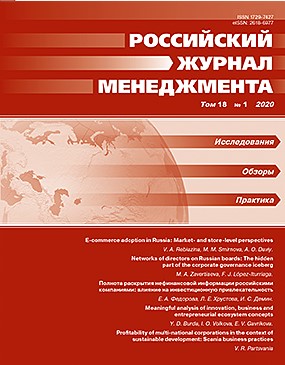Networks of directors on Russian boards: The hidden part of the corporate governance iceberg
DOI:
https://doi.org/10.21638/spbu18.2020.102Аннотация
In this paper we apply social network analysis to study the boards of directors of 107 large listed Russian firms between 2009 and 2014. Traditional corporate governance metrics, such as demographic characteristics, experience or multiple directorships, confirm a previously established positive trend towards greater independence and better qualification of the boards of Russian firms. We also find a decrease in the centrality of directors, which corroborates the diminishing concentration of power of some directors. The most connected firms have a specific profile since they are larger, have lower market valuations, and stronger ties with government (both due to higher proportions of government owned shares and a greater number of directors who are former politicians). Our findings also demonstrate that the boards of financial
institutions are less connected, whereas political and independent directors are more centralized.
Ключевые слова:
boards of directors, corporate governance, social networks, Russia
Скачивания
Библиографические ссылки
REFERENCES
Загрузки
Опубликован
Как цитировать
Выпуск
Раздел
Лицензия
Статьи журнала «Российский журнал менеджмента» находятся в открытом доступе и распространяются в соответствии с условиями Лицензионного Договора с Санкт-Петербургским государственным университетом, который бесплатно предоставляет авторам неограниченное распространение и самостоятельное архивирование.





